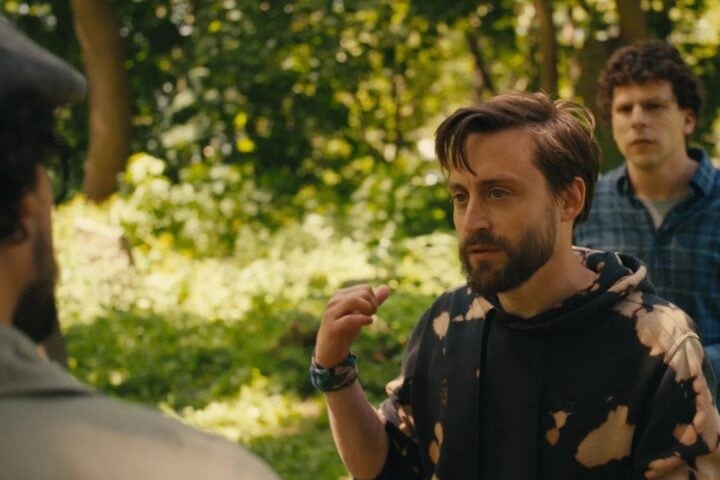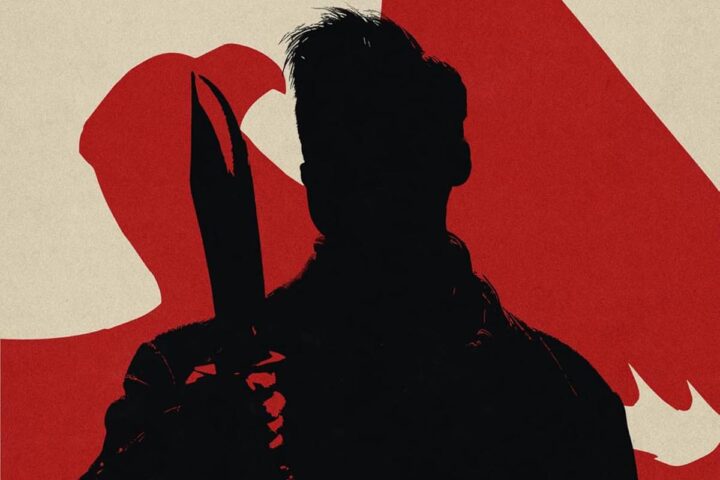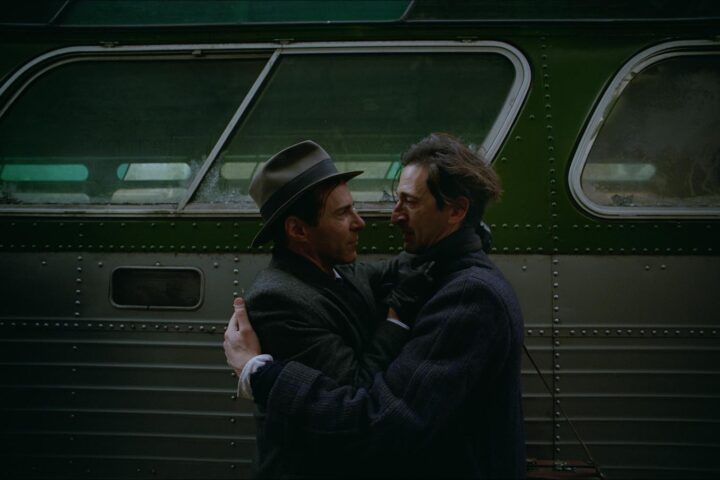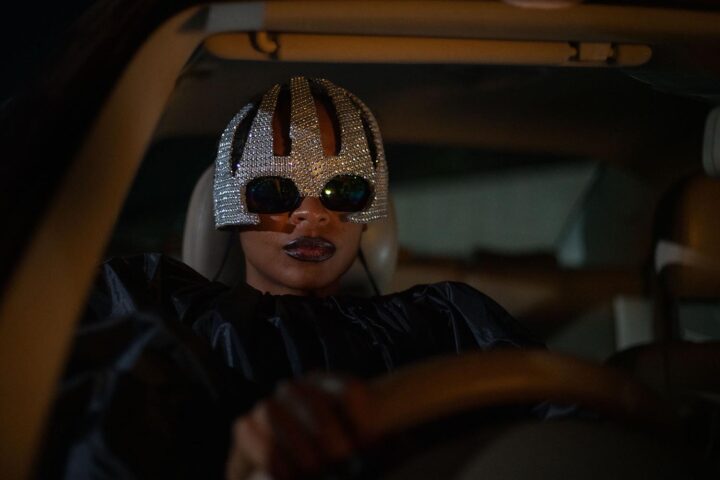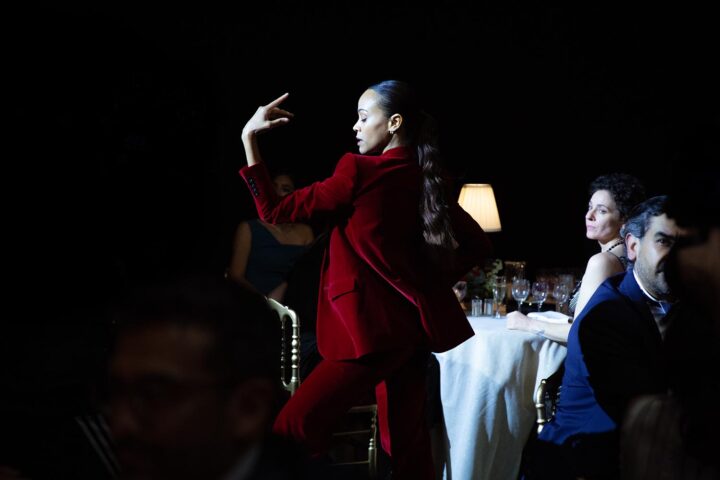Much of the press about The Shrouds since its world premiere at the Cannes Film Festival earlier this year has focused on the deeply personal inspiration for the film: David Cronenberg’s grief over the death of his wife in 2017. For those who are aware of this context going in, one could see signs of that extra investment on the writer-director’s part here and there, especially in the way one of the film’s stars, Vincent Cassel, is made up to look like Cronenberg himself. Lest that suggests something more overtly emotional than what one might expect from the Canadian auteur, though, The Shrouds dispels that notion very early on.
The film’s opening credits sequence features a bunch of swirling dots that eventually form into the outline of a woman. Allied with the insinuating low-pitched electronic droning of Howard Shore’s score, the sequence dissolves into a dreamy vision of a man looking into the prehistoric-looking underground surroundings of a nude female corpse before Douglas Koch’s camera zooms right into the yelling man’s mouth and snaps us back into reality: to Karsh Relikh (Cassel) having his teeth inspected by his dentist, Dr. Hofstra (Eric Weinthal).
Not only are we in distinctly Cronenbergian territory here, with the director thrusting forbidding bodily imagery in front of us, but as the film goes on, it becomes clear that we’re in distinctly late-Cronenbergian territory. Some of what The Shrouds shares with his previous film, Crimes of the Future, is stylistic in nature. Instead of the memorably outré sights of his earlier work, both films are abundant in dialogue scenes, in which important events are generally talked about rather than directly shown. Christopher Donaldson’s editing rhythms are relaxed, Koch’s cinematography almost unnerving in its digital clarity. Both films share broadly similar thematic obsessions as well: an alternately intrigued and critical fascination with the ways technology encroaches on humanity, a paranoid interest in rooting out underlying conspiracies.
Grief may be the starting point for what proliferates in The Shrouds, but Cronenberg has much more on his mind than that. Karsh’s response to the death of his wife, Becca (Diane Kruger), is to create GraveTech, a technology that allows people to monitor their loved ones’ corpses with the help of special shrouds—outfits with many tiny X-ray cameras embedded inside—that they don when they’re underground. When, one evening, a gravesite featuring bodies buried with GraveTech, including Becca’s, is vandalized, he, with the help of a computer programmer, Maury (Guy Pearce), try to figure out who is responsible and why. In that sense, The Shrouds could be said to be a mystery tale—one that, to give the film even more of a topical flavor, eventually involves the possibility of both Russians and Chinese interested in GraveTech.
To some degree, the mystery elements are secondary to what’s primarily a study of a deeply troubled individual. Karsh is surrounded by technology: He not only owns a self-driving Tesla, but also uses a virtual personal assistant, named Hunny (voiced by Kruger), created by Maury to help keep his life in order. (It’s fitting, then, that a climactic scene between Karsh and Maury takes place out in a forest rather than in a clinical interior space.) All the technology in the world, though, can’t console him in the wake of his great personal loss, as both an agonizingly awkward blind date early on and assorted dream sequences throughout the film demonstrate.
Karsh eventually finds some solace in the company of two women: Soo-Min Szabo (Sandrine Holt), the blind wife of a Hungarian magnate and potential client on the verge of death, and, most perversely, Becca’s sister, Terry (Kruger yet again), who, it turns out, has a fetish for conspiracy theories. Karsh and Terry’s sex scene together constitutes the one genuine moment of heat in a film that’s otherwise noteworthy for its willed sterility. (Maury’s presence adds another layer of romantic complication, since he’s Terry’s ex-husband.)
Cronenberg observes all of this with an eerie calm markedly different in emotional temperature from the overt provocations of such early films as 1983’s Videodrome and 1988’s Dead Ringers. And yet, if you’re willing to go along with his deliberate flow, there are plenty of intellectual and emotional connections to be made. One could see in The Shrouds a cautionary tale of the limits of technology in dealing with complex human emotions, especially when such technology can be so easily manipulated by outside forces—personal, multinational, or otherwise.
Even more disquieting—and what makes this film feel very much in Cronenberg’s wheelhouse—is his refusal to pass easy judgment on Karsh. There’s a romanticism to Karsh’s stated desire to be buried next to his wife in his graveyard even as there’s a grotesqueness in his obsession with using his technology to glimpse her bones. The Shrouds may see a great filmmaker in a more settled frame of mind, but that doesn’t mean that his inner provocateur is dormant, as he’s still clearly willing to dive headfirst into the depths of twisted human desire.
Since 2001, we've brought you uncompromising, candid takes on the world of film, music, television, video games, theater, and more. Independently owned and operated publications like Slant have been hit hard in recent years, but we’re committed to keeping our content free and accessible—meaning no paywalls or fees.
If you like what we do, please consider subscribing to our Patreon or making a donation.


